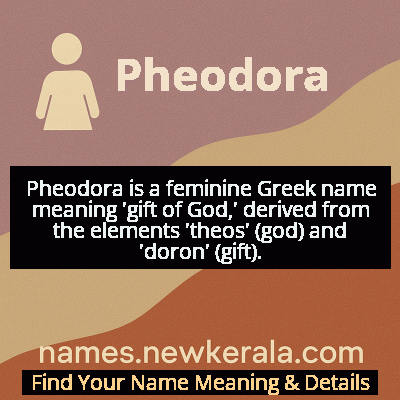Pheodora Name Meaning & Details
Origin, Popularity, Numerology Analysis & Name Meaning of Pheodora
Discover the origin, meaning, and cultural significance of the name PHEODORA. Delve into its historical roots and explore the lasting impact it has had on communities and traditions.
Name
Pheodora
Gender
Female
Origin
Greek
Lucky Number
1
Meaning of the Name - Pheodora
Pheodora is a feminine Greek name meaning 'gift of God,' derived from the elements 'theos' (god) and 'doron' (gift).
Pheodora - Complete Numerology Analysis
Your Numerology Number
Based on Pythagorean Numerology System
Ruling Planet
Sun
Positive Nature
Leaders, ambitious, highly driven, self-reliant, innovative.
Negative Traits
Overly aggressive, domineering, impatient, selfish.
Lucky Colours
Red, orange, gold.
Lucky Days
Sunday.
Lucky Stones
Ruby, garnet.
Harmony Numbers
2, 3, 9.
Best Suited Professions
Entrepreneurs, managers, engineers.
What People Like About You
Courage, determination, leadership.
Famous People Named Pheodora
Pheodora Petrovna
Byzantine noblewoman
Known for her patronage of Orthodox monasteries and significant diplomatic contributions during the Byzantine Empire
Pheodora Alexandrovna
Russian philanthropist
Established educational institutions for women and funded archaeological expeditions in Crimea
Pheodora Komnena
Byzantine princess
Documented Byzantine court life and contributed to preserving historical records of the Komnenian dynasty
Pheodora Ivanova
Modern artist
Contemporary painter known for blending traditional Byzantine iconography with modern abstract techniques
Name Variations & International Equivalents
Click on blue names to explore their detailed meanings. Gray names with will be available soon.
Cultural & Historical Significance
In Russian aristocracy, the name Feodora (the Russian equivalent) was popular among royal families, symbolizing both religious devotion and aristocratic lineage. Grand Duchess Feodora of Russia and other noble bearers of the name contributed to its association with refinement and cultural patronage. The name's journey through history reflects the transmission of Byzantine cultural influence to Slavic regions, where it maintained its prestige while adapting to local linguistic patterns. The enduring appeal of Pheodora across centuries reflects its connection to strong female figures who shaped religious, political, and cultural landscapes, making it a name that carries both historical weight and timeless elegance.
Extended Personality Analysis
Individuals named Pheodora are often perceived as possessing a natural grace combined with intellectual depth and strong moral convictions. They typically exhibit leadership qualities, showing both compassion and determination in their pursuits. The 'supreme gift' meaning often manifests as a sense of purpose and generosity, with Pheodoras frequently drawn to helping professions or creative endeavors where they can make meaningful contributions. Their personality often blends traditional values with innovative thinking, making them effective bridge-builders between established practices and new approaches.
Many Pheodoras demonstrate remarkable resilience in facing challenges, drawing strength from their sense of historical and cultural connection. They tend to be perceptive judges of character and situations, with an intuitive understanding of human nature that serves them well in both personal and professional relationships. This combination of wisdom, strength, and compassion makes them natural mentors and trusted advisors. Their approach to life often reflects the name's Byzantine heritage—balancing spiritual depth with practical effectiveness, and maintaining dignity while remaining accessible to others. Pheodoras typically value knowledge, tradition, and meaningful connections, creating rich personal and professional lives grounded in purpose and authenticity.
Modern Usage & Popularity
In contemporary naming practices, Pheodora remains a distinctive choice that appeals to parents seeking a name with historical resonance and unique character. While the standard spelling 'Theodora' has experienced a modest revival in recent years—appearing in birth registries across English-speaking countries and Europe—the 'Pheodora' variation maintains its niche appeal. The name is most commonly chosen by families with Greek heritage, Eastern Orthodox religious background, or strong interest in Byzantine history. Its usage patterns show concentration in academic, artistic, and culturally-aware communities where historical names are valued. Recent naming trends favoring strong female names with classical roots have created renewed interest in Pheodora, though it remains outside the top 1000 names in most countries. The name's rarity adds to its appeal for parents seeking something both meaningful and distinctive, positioning Pheodora as an elegant alternative to more common classical names like Sophia or Alexandra while maintaining similar historical depth and melodic quality.
Symbolic & Spiritual Meanings
Symbolically, Pheodora embodies the concept of exceptional blessing and destined purpose. The literal translation as 'supreme gift' extends metaphorically to represent individuals who carry special qualities meant to benefit their communities and generations. This symbolism connects to the idea of divine favor or exceptional destiny, suggesting that bearers of this name are meant to make significant contributions to the world around them. The name also represents the beautiful tension between tradition and individuality—honoring historical roots while asserting unique identity through its distinctive spelling.
In broader symbolic terms, Pheodora signifies the transmission of wisdom and culture across time, embodying the continuity of feminine strength and intelligence through historical epochs. It represents the idea that true gifts are those that enrich not only the recipient but create lasting positive impact. The name carries connotations of grace under pressure, intellectual depth, and spiritual richness—qualities that have been associated with its most famous historical bearers. For modern parents, choosing Pheodora often symbolizes a hope that their child will embody these noble qualities while making their own unique mark on the world.

